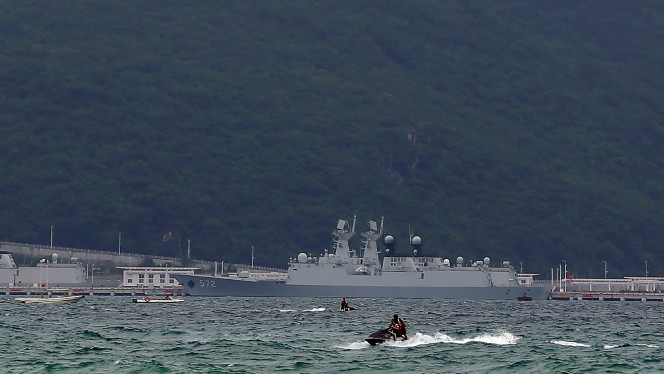China's army down South China Sea island-building
By Christopher Bodeen, Associated Press, May 26th, 2015
BEIJING (AP) — China's military on Tuesday compared its controversial island-building in the South China Sea to ordinary construction such as road-building going on elsewhere in the country, trying to deflect criticism over an issue seen as inflaming tensions in the region.
At the same venue, however, the Defense Ministry issued a report reaffirming China's more assertive approach to national defense that has put its neighbors on guard.
The document on China's military strategy said the navy would be adding "open seas protection" to traditional remit of "offshore waters defense," while boosting its ability to counterattack and conduct joint operations at sea.
The air force, meanwhile, will "endeavor to shift its focus from territorial air defense to both defense and offense," said the 25-page report, which was issued in English and Chinese at a rare news conference presided over by uniformed officers.
The report's issuance and comments from ministry spokesman Yang Yujun at the briefing followed a formal Chinese protest over an incident last week in which a Chinese navy dispatcher warned off a U.S. Navy P8-A Poseidon surveillance aircraft as it flew over Fiery Cross Reef, where China has conducted extensive reclamation work.
The incident, documented by a CNN news crew on board the U.S. plane, prompted a testy editorial Monday in the official Communist Party newspaper Global Times that warned that Washington should not test Beijing's restraint or China would have "no choice but to engage."
China has bristled at what it sees as U.S. interference in the region and says it is within its sovereign rights in developing islands made from sand piled on top of reefs and atolls. The U.S. and many of China's neighbors see the island-building as an upending of the status quo by China to bolster its claims to the region and possibly pave the way for military installations far from its shores.
In one disputed area, the Spratly Islands, U.S. officials say China has created about 800 hectares (2,000 acres) of dry land since 2014 that could be used as airstrips. The U.S. argues that man-made constructions cannot be used to claim sovereignty and is closely watching for signs that China will seek to back up its claims by basing missile systems and fighter aircraft on the newly formed islands.
However, Yang sought to minimize the military significance of the island developments and said the issue has been exaggerated by those seeking an excuse to take unspecified actions in response — a clear reference to the United States.
"Every day all around China, there are all kinds of construction projects being started (such as) building homes, paving roads, building bridges, opening new farm land, etc.," Yang said.
"Looking from the angle of sovereignty, China's development of construction on its islands is no different at all from all the other types of construction going on around the country that I just mentioned," he said.
Such construction is designed to satisfy both military and civilian purposes such as disaster mitigation, fisheries protection and weather monitoring, Yang said.
State Department spokesman Jeff Rathke told reporters in Washington that the U.S. takes a different view. He said that China's extensive land reclamation had contributed to rising tensions in the region. He reiterated the U.S. stance that under international law, creating artificial islands does not alter the sovereignty of the surrounding seas.
Without directly mentioning the U.S., Yang said the issue had been brought to the fore by an increase in surveillance activities and an effort to "deliberately play up the issue in order to smear China's military and raise tensions in the region.
"I don't rule out that certain countries are looking for excuses to take certain actions," Yang said.
He declined to say what additional measures China might take to enforce its claims and said overall relations between the U.S. and Chinese militaries are positive.
China lays claim to virtually the entire South China Sea, while Taiwan, Brunei, Malaysia, Vietnam and the Philippines say they own all or parts of it.
In Taiwan on Tuesday, the island's president, Ma Ying-jeou, issued a call for setting aside sovereignty disputes and jointly exploring for resources in the area. Taiwan occupies a number of islands, but doesn't seek to enforce its overlapping claim with China.
The desire to assert its territorial claims is at least partly behind an upgrading of the military to allow China to project power into the western Pacific, Indian Ocean and elsewhere.
That includes the addition of an aircraft carrier, new submarines and surface ships, as well as a more ambitious training regimen such as air force drills in international airspace off the east coast.

No comments:
Post a Comment
Comments always welcome!